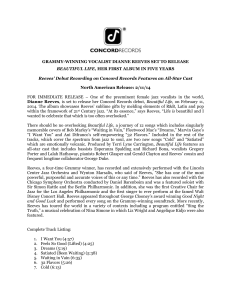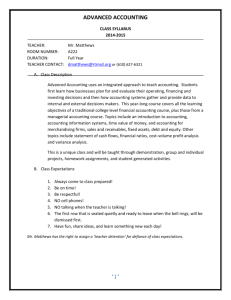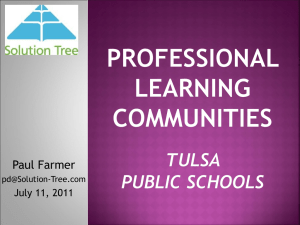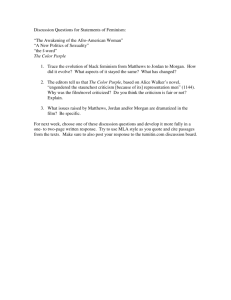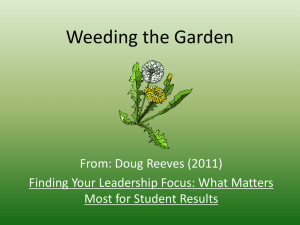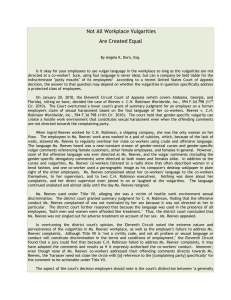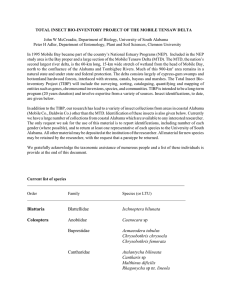Two-Source Synthesis-Analysis Problem Essay
advertisement
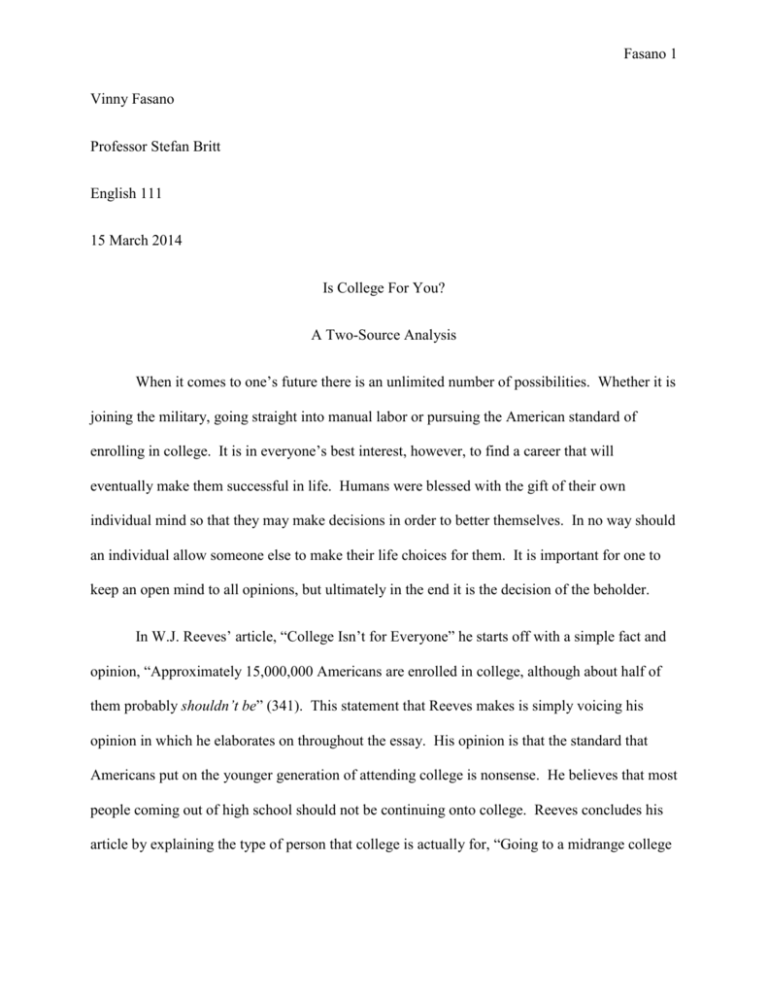
Fasano 1 Vinny Fasano Professor Stefan Britt English 111 15 March 2014 Is College For You? A Two-Source Analysis When it comes to one’s future there is an unlimited number of possibilities. Whether it is joining the military, going straight into manual labor or pursuing the American standard of enrolling in college. It is in everyone’s best interest, however, to find a career that will eventually make them successful in life. Humans were blessed with the gift of their own individual mind so that they may make decisions in order to better themselves. In no way should an individual allow someone else to make their life choices for them. It is important for one to keep an open mind to all opinions, but ultimately in the end it is the decision of the beholder. In W.J. Reeves’ article, “College Isn’t for Everyone” he starts off with a simple fact and opinion, “Approximately 15,000,000 Americans are enrolled in college, although about half of them probably shouldn’t be” (341). This statement that Reeves makes is simply voicing his opinion in which he elaborates on throughout the essay. His opinion is that the standard that Americans put on the younger generation of attending college is nonsense. He believes that most people coming out of high school should not be continuing onto college. Reeves concludes his article by explaining the type of person that college is actually for, “Going to a midrange college Fasano 2 is of value only for those students who wish to become educated and accept the fact that attendance, punctuality, and hard work are parts of the process” (344). Another article which contrasts the main ideas in Reeves’ piece is Jay Matthews’ “Multiplying Benefits of College for Everybody”. Matthews begins by stating all of the points that Reeves makes in his article of why college is not for everyone and then he contradicts and counter argues as to why college is for anybody. Jay Matthews clearly states the argument in the beginning paragraph in his article: They say some kids are not capable of succeeding in college. They say some kids don’t want to go to college. They say if everyone went to college, who would do the important non-college jobs, like plumbing and carpentry and auto repair? They say if everyone went to college, we wouldn’t have a lot of unemployed college graduates—as has happened in some underdeveloped countries—with neither the skills nor the desire to work with their hands. (355) He then counter argues with the statement a few sentences later saying, “My quick response: Maybe there will come a day when we have more college grads than we need, and the smartest high schoolers will compete to get into the best trade schools” (Matthews 355). His point is that there is nothing wrong with an overpopulated world of higher-achievers with a college degree. He believes that even though the college grads will have taken the higher paying white collar jobs there will still be the blue collar jobs that the smartest high schoolers will go on to work. The truth is that not everybody will be blessed enough to go on to college past high school, but there are still jobs available for those high school students that do want to have a decent career and create a successful life. College is not an easy route to take past high school. Fasano 3 It takes commitment, time, hard work, and a mass amount of money. But for those who actually want to take the time and effort out to go to college then they should not be denied a chance. It is clear the Reeves’ article and Matthews’ article contrast much more than they do compare. Although both authors are on the topic of college, they make their points very clear and obvious to their audience. Reeves’ point is clear that college is not for everyone and that these schools should not be allowing anyone with a high school diploma to enroll. Matthews’ article is more of a counter argument to Reeves’ essay by saying that everyone should have a chance to go to college and he makes the benefits of college clear. Regardless of what anyone has to say about the path someone should take in their life, it is conclusively in their hands what they decide to do. Any human being has the capability of doing anything they would like to do and become anyone they want to in their lifetime. Letting other people decide your fate is communism. Freedom in the country America allows people to think for themselves regardless of what anyone has to tell them. As the great and honorable Walt Disney once said, “If you can dream it, you can do it” and this statement will forever hold true. Fasano 4 Works Cited Reeves, W.J. “College Isn’t for Everyone.” Exploring Relationships: Globalizing and Learning in the 21st Century. Ed. Dominic, DelliCarpini. New York, New York: Longman, 2012. 341-345. Print. Matthews, Jay. “Multiplying Benefits of College for Everybody.” Exploring Relationships: Globalizing and Learning in the 21st Century. Ed. Dominic, DelliCarpini. New York, New York: Longman, 2012. 355-357. Print.
